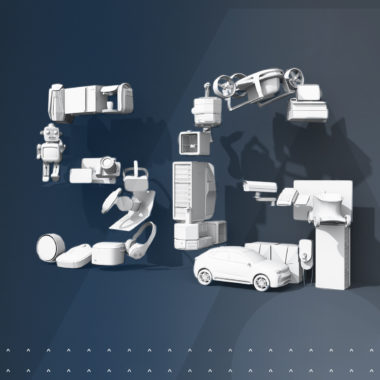It was great to be back in Barcelona for MWC this year – first time back since the pandemic and it really felt like no time had passed at all. 3 weeks on and my mind is still abuzz with the announcements, learnings, insights on Private networks and themes coming out from the show.
5G powers more than the Metaverse
Whether you were on the ground, or just observing from afar, the theme that likely jumped out at you is the Metaverse. Not just constrained to the halls of the Fira, the Metaverse has dominated headlines for a while now – quite an impressive feat considering there’s still a lack of clear consensus about its future, applications, and value. This article from CNBC encapsulates the sentiment perfectly; despite being the buzzword of the moment, it’s still quite a nebulous term.
That said, it still appeared to dominate the conference, especially when it came to 5G. Mark Zuckerberg addressed the mobile industry on day one of the conference – a statement that made it perfectly clear that the future of the Metaverse depends on 5G connectivity. This was followed by the announcement of a new partnership with Telefónica to establish a Metaverse Innovation Hub in Madrid; just one of the many Metaverse-related announcements made at MWC this year (we even jumped on the bandwagon in our post-show report).
That said, for me and many others in the industry, this is not what stood out the most at MWC 22. During my post-conference reading I came across this wrap up post from James Blackman, and I couldn’t agree with his sentiments more – despite the hype and headlines, this year’s show was actually about enterprise IoT and private 5G networks.
Shining some publicity on private networks
As mentioned in a previous MWC reflection post, 5G connectivity really does possess the power to unlock the potential of IoT – and this is true when we really focus on private networking too.
We’ve spoken at length before, about the transformative impact IoT can have within the enterprise, the importance for these networks to be private and why 5G is the network to enable this – so one of the announcements that caught our attention was the news that AT&T and Microsoft had penned a private network deal. The deal highlighted the benefits for multiple sectors, including manufacturing– where cameras and AI tools can assist in everything from robotic assembly to “event detection” – such as when a worker has been injured or a fire has started – and then alert first responders or activate fire suppression systems almost instantly.
As shown by this announcement, private networks give businesses the chance to connect their facilities and manufacturing. And, during MWC other big players like Cisco made similar headlines with their Private 5G solution. In fact, manufacturing had its own conference track at the event this year with a big focus on connectivity for Industry 4.0. Beyond manufacturing, there are many other sectors that will benefit from 5G enabled private networks – whether it’s healthcare, emergency services or the railways.
In case you missed them, here were some of the other key private network announcements made at the show this year:
- HPE introduced a new private 5G solution that “offers seamless interworking across both private 5G and Wi-Fi networks. The solution is based on the HPE 5G Core Stack and comes pre-integrated with RAN solutions from Airspan and other leading vendors.”
- Qualcomm announced a partnership with Microsoft to deliver an end-to-end, easy-to-deploy, scalable 5G private network solution that aims to reduce adoption barriers and operating costs for high-performance 5G connectivity solutions
- Capgemini’s private network solutions are set to become integrated with Microsoft Azure’s Private 5G Core with Qualcomm’s advanced 5G technologies and Capgemini’s MEC platform to bring end-to-end simplified solutions for enterprises. The solution will be validated in Capgemini’s 5G Lab in Portugal.
Battle for the $64 billion market
It’s fair to say that private networks are still classed as an emerging market – but a rapidly developing one, and one that provides an opportunity to MNOS. According to ABI Research, demand for private network capability from multiple industry verticals could generate revenues of $64 billion by 2030.
Harking back to James Blackman’s MWC wrap up – he said that we need to steer clear of the narrative that there is a battle between three industries for the ‘soul of 5G’, and the battle for supremacy to capitalize on this market is not as simple as it’s made out to be.
These sentiments echo our thoughts; earlier on in the year we spoke about the shift in this narrative.
In the past operators were played off against GAFAMs, however 5G has changed the rules of this game and made it a much more nuanced space. The regulation governing spectrum access is a patchwork, allowing newcomers to bid in auctions for the right to run 4G and private 5G networks. Specialized system integrators are also aware of the huge potential returns and are now competing with the telcos. These new entrants include disruptive equipment manufacturers and so-called ‘hyperscalers’ such as AWS, Microsoft, and Google.
While 3G and 4G were built on hardware-based network functions, 5G is ‘cloud-native’. In other words, the network functions that would traditionally be delivered by hardware are instead run as software applications on remote servers. It’s a new way to run a network, and it will require operators and hyperscalers to collaborate closely.
The future of private networks
Earlier on this year, GlobalData predicted that most 5G business-to-business (B2B) market activity this year would focus on private 5G/LTE networks for industry. And it’s safe to say that this was an accurate prediction, as this conference was the moment where a significant level of companies threw their hat into the private networking arena.
So, what does this mean for MNOs? It’s certainly true that they face strong competition to private services to private networks – but they do have a advantages in their favour which we have spoken on before.
MWC may be over for another year but expect further analysis and updated from us on the private network market as it continues to evolve.
For further reading:
How can MNOs ‘win’ $64 Billion private networks opportunity?
Think private networking is a future tech? Here are 7 live deployments



